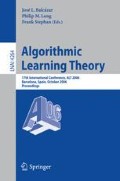Abstract
A model for learning in the limit is defined where a (so-called iterative) learner gets all positive examples from the target language, tests every new conjecture with a teacher (oracle) if it is a subset of the target language (and if it is not, then it receives a negative counterexample), and uses only limited long-term memory (incorporated in conjectures). Three variants of this model are compared: when a learner receives least negative counterexamples, the ones whose size is bounded by the maximum size of input seen so far, and arbitrary ones. We also compare our learnability model with other relevant models of learnability in the limit, study how our model works for indexed classes of recursive languages, and show that learners in our model can work in non-U-shaped way — never abandoning the first right conjecture.
Access this chapter
Tax calculation will be finalised at checkout
Purchases are for personal use only
Preview
Unable to display preview. Download preview PDF.
References
Angluin, D.: Finding patterns common to a set of strings. Journal of Computer and System Sciences 21, 46–62 (1980)
Angluin, D.: Queries and concept learning. Machine Learning 2, 319–342 (1988)
Blum, L., Blum, M.: Toward a mathematical theory of inductive inference. Information and Control 28, 125–155 (1975)
Baliga, G., Case, J., Jain, S.: Language learning with some negative information. Journal of Computer and System Sciences 51(5), 273–285 (1995)
Baliga, G., Case, J., Merkle, W., Stephan, F., Wiehagen, R.: When unlearning helps (manuscript, 2005), http://www.cis.udel.edu/~case/papers/decisive.ps
Bowerman, M.: Starting to talk worse: Clues to language acquisition from children’s late speech errors. In: Strauss, S., Stavy, R. (eds.) U-Shaped Behavioral Growth. Developmental Psychology Series. Academic Press, New York (1982)
Case, J., Lynes, C.: Machine inductive inference and language identification. In: Nielsen, M., Schmidt, E.M. (eds.) ICALP 1982. LNCS, vol. 140, pp. 107–115. Springer, Heidelberg (1982)
Case, J., Smith, C.: Comparison of identification criteria for machine inductive inference. Theoretical Computer Science 25, 193–220 (1983)
Fulk, M.: Prudence and other conditions on formal language learning. Information and Computation 85, 1–11 (1990)
Gold, E.M.: Language identification in the limit. Information and Control 10, 447–474 (1967)
Jain, S., Kinber, E.: Learning languages from positive data and negative counterexamples. In: Ben-David, S., Case, J., Maruoka, A. (eds.) ALT 2004. LNCS (LNAI), vol. 3244, pp. 54–68. Springer, Heidelberg (2004)
Jain, S., Kinber, E.: Iterative learning from positive data and negative counterexamples. Technical Report TRA3/06, School of Computing, National University of Singapore (2006)
Jain, S., Kinber, E.: Learning languages from positive data and negative counterexamples. Journal of Computer and System Sciences (to appear, 2006)
Jain, S., Osherson, D., Royer, J., Sharma, A.: Systems that Learn: An Introduction to Learning Theory, 2nd edn. MIT Press, Cambridge (1999)
Lange, S., Zeugmann, T.: Incremental learning from positive data. Journal of Computer and System Sciences 53, 88–103 (1996)
Lange, S., Zilles, S.: Comparison of query learning and gold-style learning in dependence of the hypothesis space. In: Ben-David, S., Case, J., Maruoka, A. (eds.) ALT 2004. LNCS (LNAI), vol. 3244, pp. 99–113. Springer, Heidelberg (2004)
Motoki, T.: Inductive inference from all positive and some negative data. Information Processing Letters 39(4), 177–182 (1991)
Pinker, S.: Formal models of language learning. Cognition 7, 217–283 (1979)
Popper, K.: The Logic of Scientific Discovery, 2nd edn. Harper Torch Books, New York (1968)
Rogers, H.: Theory of Recursive Functions and Effective Computability. McGraw-Hill, New York (1967); Reprinted by MIT Press in 1987.
Wiehagen, R.: Limes-Erkennung rekursiver Funktionen durch spezielle Strategien. Journal of Information Processing and Cybernetics (EIK) 12, 93–99 (1976)
Zeugmann, T., Lange, S.: A guided tour across the boundaries of learning recursive languages. In: Lange, S., Jantke, K.P. (eds.) GOSLER 1994. LNCS (LNAI), vol. 961, pp. 190–258. Springer, Heidelberg (1995)
Author information
Authors and Affiliations
Editor information
Editors and Affiliations
Rights and permissions
Copyright information
© 2006 Springer-Verlag Berlin Heidelberg
About this paper
Cite this paper
Jain, S., Kinber, E. (2006). Iterative Learning from Positive Data and Negative Counterexamples. In: Balcázar, J.L., Long, P.M., Stephan, F. (eds) Algorithmic Learning Theory. ALT 2006. Lecture Notes in Computer Science(), vol 4264. Springer, Berlin, Heidelberg. https://doi.org/10.1007/11894841_15
Download citation
DOI: https://doi.org/10.1007/11894841_15
Publisher Name: Springer, Berlin, Heidelberg
Print ISBN: 978-3-540-46649-9
Online ISBN: 978-3-540-46650-5
eBook Packages: Computer ScienceComputer Science (R0)

